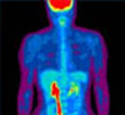by
Barbara Kram, Editor | April 29, 2008

The National Oncologic
PET Registry (NOPR)
is a collaboration
of ACRIN, ACR, & AMI
Clinicians changed the intended care of more than one in three cancer patients as the result of FDG-PET scan findings, according to a study of data from the National Oncologic PET Registry, published in the Journal of Clinical Oncology (JCO).
The study analyzed data regarding nearly 23,000 patients contributed to the NOPR by more than 1,200 facilities nationwide providing positron emission tomography (PET) scans.
"The NOPR working group sought to measure the impact of PET findings on patient management in a manner minimally intrusive to care providers. This was critical for successfully collecting the large amount of data required for a robust analysis," said Bruce Hillner, MD, lead author for the study and professor and eminent university scholar in the Department of Internal Medicine at Virginia Commonwealth University.



Ad Statistics
Times Displayed: 62296
Times Visited: 2040 Ampronix, a Top Master Distributor for Sony Medical, provides Sales, Service & Exchanges for Sony Surgical Displays, Printers, & More. Rely on Us for Expert Support Tailored to Your Needs. Email info@ampronix.com or Call 949-273-8000 for Premier Pricing.
Sponsored by the Academy of Molecular Imaging (AMI) and managed by the American College of Radiology (ACR) and the ACR Imaging Network (ACRIN), the NOPR was designed to collect questionnaire data from referring physicians on intended patient management before and after a FDG-PET scan.
The NOPR participating PET facility collects from referring physicians both a pre-PET questionnaire (documenting study indication, cancer type and anticipated stage, and planned management if PET were not available) and one of several post-PET questionnaires that assess the referring physician's planned management in light of the FDG-PET findings.
Analysis of data collected found that FDG-PET is associated with a 36.5% change in the decision of whether or how to treat a patient's cancer. NOPR working group co-chair R. Edward Coleman, MD, professor of radiology and chief of the Division of Nuclear Medicine at Duke University School of Medicine and an AMI founding member, comments, "We were especially surprised by the impact of the PET findings on patients who were originally planned to have a biopsy. The procedure was avoided in approximately three-quarters of these patients."
The NOPR was launched in May 2006 in response to the Center for Medicare and Medicaid Services' (CMS) novel "Coverage with Evidence Development" policy to collect data through a clinical registry to inform the center's FDG-PET coverage determination decisions for currently non-covered cancer indications.
Cancer types Medicare currently covers for reimbursement only through the NOPR include those of the ovary, uterus, prostate, pancreas, stomach, kidney and bladder. (For a complete list of NOPR covered cancer types and indications, go to www.cancerpetregistry.org.)

